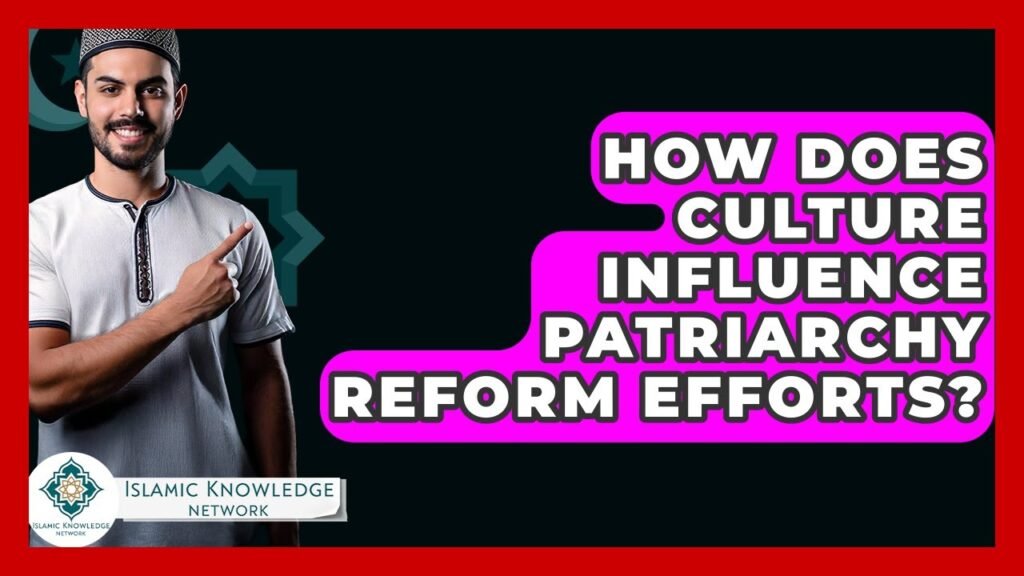Disclaimer:
The content published on this website is provided for general informational purposes only. Articles are generated with the assistance of artificial intelligence and are reviewed periodically; however, accuracy cannot be guaranteed in all cases. Readers are encouraged to verify important information from reliable and authoritative sources before relying on it. The website does not intend to mislead, and any errors found will be corrected when identified.
How Does Culture Influence Patriarchy Reform Efforts? – Islamic Knowledge Network
Culture plays a pivotal role in shaping societal norms and values, and its influence is particularly pronounced in the context of patriarchy and reform efforts aimed at empowering women. Within various Islamic societies, the interplay between cultural beliefs and religious teachings can either bolster or challenge existing patriarchal structures. Understanding this dynamic is crucial for fostering effective reform initiatives that resonate with the community’s beliefs while promoting equality and justice.
At Airlink Hajj and Umrah, we are dedicated to providing insights not only into the spiritual journeys of Hajj and Umrah but also into the broader social issues affecting the Muslim world today. Our blog offers updates on pilgrimage practices while exploring vital topics such as patriarchal reform and cultural influences. By shedding light on how culture interacts with gender dynamics, we aim to encourage informed discussions that pave the way for positive change. Engage with us to explore these critical issues while staying updated on all aspects of Hajj and Umrah through our comprehensive resources.
How Does Culture Shape Patriarchy Reform in Muslim Societies?
Cultural dynamics play a crucial role in shaping patriarchy reform in Muslim societies. While the Quran and Hadith present egalitarian principles, the interpretation of these texts often reflects prevailing cultural norms. In many instances, local traditions can reinforce patriarchal structures, leading to resistance against gender equality. However, reform movements within these societies have harnessed cultural narratives to advocate for women’s rights and empowerment.
Progressive scholars and activists have been instrumental in redefining cultural norms by highlighting gender equality within Islamic texts. Educational initiatives and community engagement serve as platforms for dialogue, making strides toward dismantling patriarchal systems. Moreover, cultural events and religious gatherings can become avenues for promoting women’s voices, fostering a collective consciousness that supports reform.
In this context, our blog at Airlink Hajj and Umrah provides updates not only on religious practices but also on social developments affecting Muslim communities. We encourage readers to explore how cultural shifts can facilitate necessary reforms in gender roles. By examining the intersection of culture and religion, we can promote a deeper understanding of the path toward gender equality, especially in the realms of Hajj and Umrah experiences, where inclusivity is essential.
FAQ on “How Does Culture Shape Patriarchy Reform in Muslim Societies?”
FAQs for "How Does Culture Shape Patriarchy Reform in Muslim Societies?"
1. What role does culture play in maintaining patriarchal structures in Muslim societies?
Culture influences social norms, values, and practices that often reinforce patriarchal systems. Traditional beliefs can legitimize male authority and control, making it challenging to achieve gender equality.
2. How can cultural narratives be reshaped to promote patriarchy reform?
Reforming cultural narratives involves engaging community leaders, storytellers, and educators to highlight positive role models and narratives that support gender equality, thereby fostering new social norms.
3. Are there examples of successful patriarchy reform initiatives in Muslim contexts?
Yes, initiatives such as grassroots women’s movements, educational programs, and legal reforms in various countries have effectively challenged patriarchal norms and empowered women, leading to gradual societal change.
4. How do changes in education impact the reform of patriarchal structures?
Increased access to education for women and girls can challenge traditional gender roles, raise awareness of rights, and empower women to participate more fully in social, economic, and political life, thereby promoting reform.
5. What challenges do reformers face when addressing patriarchy in Muslim societies?
Reformers often encounter resistance from conservative factions, cultural stigmas, and entrenched power dynamics. Additionally, the complexity of interpreting religious texts and cultural practices can complicate reform efforts.
Mushu, an experienced Saudi Arabia traveler and writer, shares insightful tips and spiritual reflections to enhance Hajj and Umrah journeys for fellow pilgrims. He has been to Makkah and Madina from 2016 to 2023 many times and his posts will reflect this.







